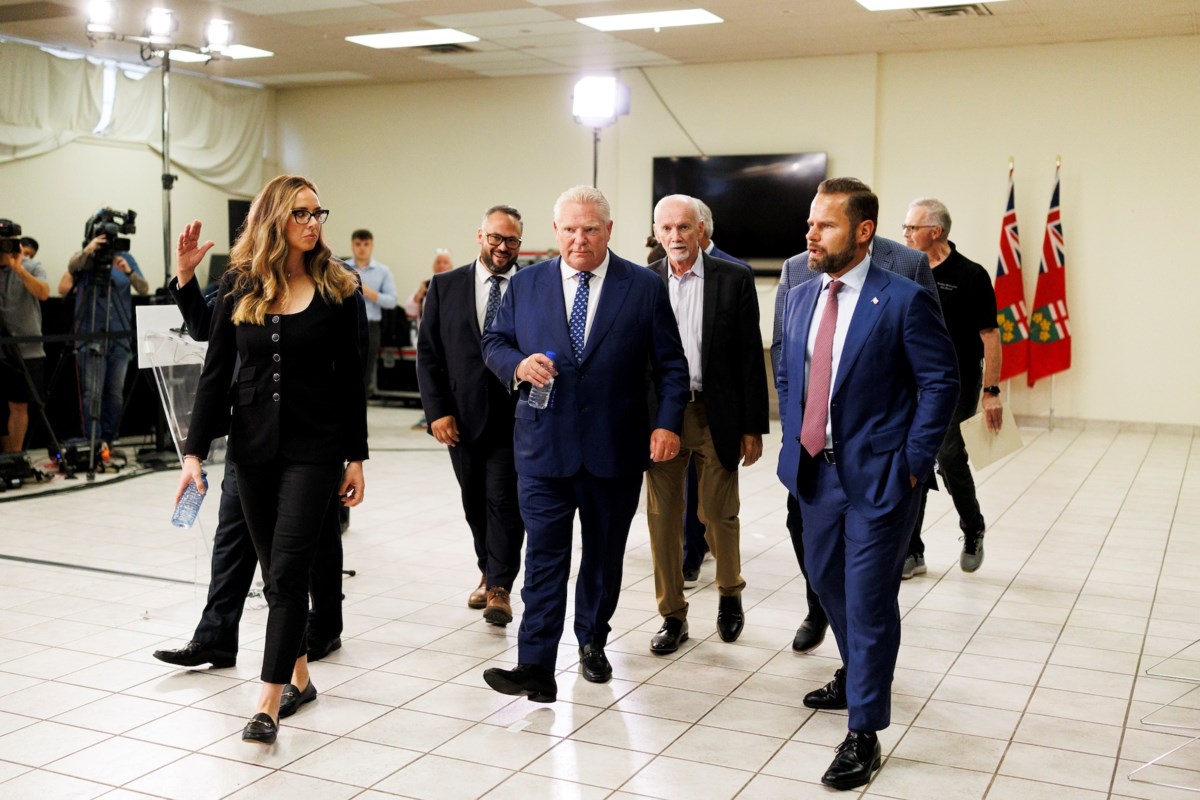Doug Ford went on a tear and mused about nationalizing Stelco over its parent company’s support for Trump’s tariffs
EDITOR’S NOTE: This article originally appeared on The Trillium, a new Village Media website devoted to covering provincial politics at Queen’s Park.
Ontario is beefing up funding for job retraining and employment services as U.S. trade aggression threatens the job market.
Premier Doug Ford announced $70 million in funding at a United Steelworkers local in Hamilton, flanked by union representatives.
“I want to thank all the great workers and the union members here today — we’ll always have your backs, and I want to promise you our government will be there for you when you need the help,” the premier said.
Most of the funding, $50 million, is going to Better Jobs Ontario (BJO) to provide Ontarians with skills training for in-demand jobs and financial support for costs such as tuition, transportation and child care during training.
Another $20 million is going to Protect Ontario Workers Employment Response Centres — or POWER Centres — which is a rebranding of the “action centres” the province previously established to offer temporary transition assistance for workers after mass layoffs. The province announced it will be able to launch these centres proactively going forward.
The announcement was welcomed by Kevon Stewart, director of District 6 of the United Steelworkers union, which runs three job action centres.
Stewart spoke about 1,000 jobs the union expects to be lost because of the transition to electric arc furnaces at Algoma in Sault Ste. Marie and 130 of his members who are losing their jobs in Hamilton with the closure of ArcelorMittal’s wire-drawing facility.
“We all know losing your job or seeing your plant close is traumatic,” he said. “When you are faced with that kind of trauma, the kind of trauma that you experience when you can’t pay your mortgage, you can’t pay for dinner, and it is hard to just trust anyone, getting help from someone who truly understands what you’re going through makes all the difference.”
But the biggest threat, he said, is the U.S. tariffs.
“Canadian and American manufacturers have an integrated supply chain, and these tariffs cost jobs on both sides of the border,” said Stewart.
Ford railed against U.S. President Donald Trump and his tariffs, and said Ontario was unprepared for the economic attack from its closest ally.
“No one in a million years would think the guy named President Trump would come along and start an economic war with his closest friend and ally, not to mention, you know, with the rest of the world,” he said. “And then the rest of the world goes back and kisses his a— behind all the time. We aren’t going to do that. We’re going to fight like we’ve never fought before.”
The other target of the premier’s rage was Cleveland-Cliffs, the U.S.-based parent company of Stelco, which has expressed open support for Trump’s tariffs.
“I love the workers, but their owner — I got a problem with that guy,” he began, adding that CEO Lourenco Goncalves “doesn’t give two hoots about his workers at Stelco.”
“So maybe they should find a new owner for Stelco,” he added. “Maybe we should just buy him. Why doesn’t he just stay in the U.S.? Because I’m done with this guy.”
Cleveland-Cliffs did not immediately respond to a request for comment.
Asked if his retraining announcement was an acknowledgement that more steelworkers are going to lose their jobs, Ford said steelworkers should try to stay positive.
“There’s more opportunities,” he said. “We’re going to do everything we can to protect you. We’re going to protect your companies and we’ll protect your jobs to the best of our ability.”

